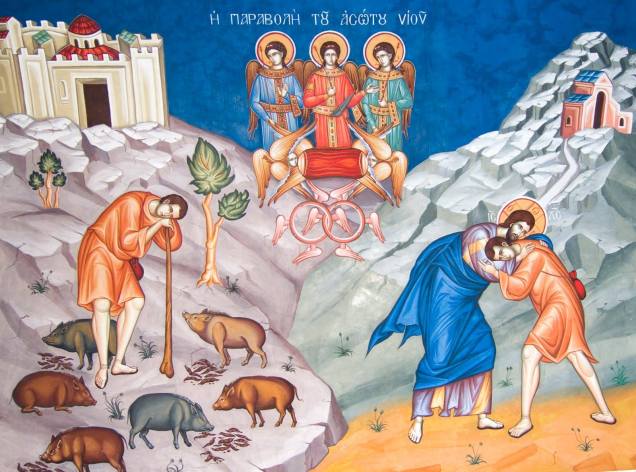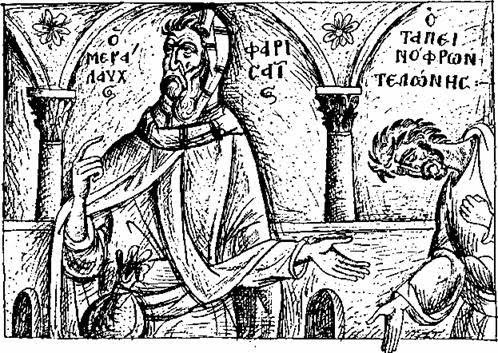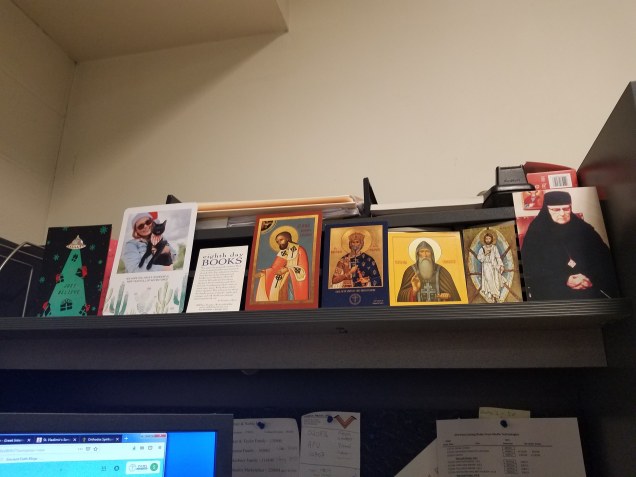 As I noted in a previous post, last Sunday we opened the Lenten Triodion and so began the cycle of pre-Lenten Sundays that will lead us to Great Lent proper in a couple of weeks. Each week has a specific theme: last week’s was the parable of the Publican and the Pharisee, while today focused on the parable of the Prodigal Son—perhaps one of the best known passages of the New Testament. In addition to the hymnography specific to each week, there are some texts only sung at the Matins services of these pre-Lenten Sundays. Last week I discussed the special post-Gospel stichera “Open to me the doors of repentance, O Life-Giver…” We begin the other notable addition this Sunday. After the Polyeleos (Psalm 134/5 & 135/6) we sing Psalm 136/7:
As I noted in a previous post, last Sunday we opened the Lenten Triodion and so began the cycle of pre-Lenten Sundays that will lead us to Great Lent proper in a couple of weeks. Each week has a specific theme: last week’s was the parable of the Publican and the Pharisee, while today focused on the parable of the Prodigal Son—perhaps one of the best known passages of the New Testament. In addition to the hymnography specific to each week, there are some texts only sung at the Matins services of these pre-Lenten Sundays. Last week I discussed the special post-Gospel stichera “Open to me the doors of repentance, O Life-Giver…” We begin the other notable addition this Sunday. After the Polyeleos (Psalm 134/5 & 135/6) we sing Psalm 136/7:
Month: February 2019
Something Greater is Here
![]() I recently hit Matthew 12 again in my daily Bible reading. This time around, I was particularly struck by Christ’s assertion—repeated three times in this chapter—that something greater is here. The latter two repetitions come in the context of the sign of Jonah:
I recently hit Matthew 12 again in my daily Bible reading. This time around, I was particularly struck by Christ’s assertion—repeated three times in this chapter—that something greater is here. The latter two repetitions come in the context of the sign of Jonah:
Then some of the scribes and Pharisees said to him, “Teacher, we wish to see a sign from you.” But he answered them, “An evil and adulterous generation seeks for a sign; but no sign shall be given to it except the sign of the prophet Jonah. For as Jonah was three days and three nights in the belly of the whale, so will the Son of man be three days and three nights in the heart of the earth. The men of Nin′eveh will arise at the judgment with this generation and condemn it; for they repented at the preaching of Jonah, and behold, something greater than Jonah is here [καὶ ἰδοὺ πλεῖον Ἰωνᾶ ὧδε]. The queen of the South will arise at the judgment with this generation and condemn it; for she came from the ends of the earth to hear the wisdom of Solomon, and behold, something greater than Solomon is here [καὶ ἰδοὺ πλεῖον Σολομῶνος ὧδε]. (Mt 12:38–42) Continue reading
Pre-Lent Begins: The Sunday of the Publican and the Pharisee
 Today, the Sunday of the Publican and the Pharisee, marks the real beginning of our long journey to Pascha, which this year falls relatively late, on April 28th. That’s over two months away. Great Lent itself doesn’t begin until March 11th. Several years back I remember trying to explain “pre-Lent”—the weeks of preparation leading up to Great Lent, which is itself a preparation for Holy Week and Pascha—to a Roman Catholic friend, who reacted with a fair degree of bemusement. My first year at seminary I had a similar conversation with my mom in the context of a larger discussion about Orthodox fasting practices (“Yes, chicken counts as meat,” and so on).
Today, the Sunday of the Publican and the Pharisee, marks the real beginning of our long journey to Pascha, which this year falls relatively late, on April 28th. That’s over two months away. Great Lent itself doesn’t begin until March 11th. Several years back I remember trying to explain “pre-Lent”—the weeks of preparation leading up to Great Lent, which is itself a preparation for Holy Week and Pascha—to a Roman Catholic friend, who reacted with a fair degree of bemusement. My first year at seminary I had a similar conversation with my mom in the context of a larger discussion about Orthodox fasting practices (“Yes, chicken counts as meat,” and so on).
From an outside perspective, and perhaps even for many people within the Church, throwing a pre-Lent on top of the 40(ish) days of Lent can seem rather excessive. But I have come to deeply appreciate these “warm up” weeks in which the Church leads us to the Great Fast. They not only ease us into the more rigorous fasting expected during Lent, they also make it abundantly clear why we’re doing all of this, and what spirit we should seek to cultivate as Lent approaches. Continue reading
On Having a Sense of Humor in the Church; Or, One Reason Why I Love My Godparents

This Sunday my home parish will be celebrating “Godparent Sunday,” its yearly marker of this important relationship within the Church. I will, alas, not be there to celebrate with my godparents—a hazard of living a few states away. So to mark the occasion from a distance, I wanted to write briefly about one of the reasons why I love my godparents. To be sure, this is only one reason. There is so much to appreciate about them, and they have done so much for me, including taking me into their own home for several months, and then sending me on my way to seminary. They have gone far above and beyond just being my “sponsors” and have truly been godparents, which is to say, family. I am more thankful for them I can say. But for the purposes of this post, I want to focus on just one thing I love about them: having a sense of humor in the Church. Continue reading
On Customer Service and Patience

This week at work has found me repeatedly having to dig deep for patience. Already on Monday I was commenting that my threshold for nonsense was feeling dangerously low—dangerously so because, the truth is, I have to deal with a lot of nonsense.
We only have two full time people working in the bookstore, so my job is multifaceted, encompassing more or less everything but the actual packing and shipping (which our part-time staff does) and ordering from suppliers (which our bookstore manager takes care of). I pick the items for orders, which for places like Amazon can be several hundred at a time; I process all the returns; I’ve increasingly been updating spreadsheets; I fold and assemble packs of cards as needed; I’m periodically sent to go represent the Press at various events; and in, short, I do whatever needs to be done on a particular day. Continue reading
Thomas Merton, The Seven Storey Mountain
 I recently finished reading Thomas Merton’s The Seven Storey Mountain: An Autobiography of Faith. First published in 1948, it tells the story of Merton’s (1915–1968) colorful childhood, youthful wanderings and disillusionment, conversion to Roman Catholicism, and, ultimately, his entrance into the Trappist Abbey of Gethsemani located in Kentucky. Merton wrote this book when he was still relatively new to to monastic life, shortly after he took his solemn vows. He would go on to write many more, as the end of the present work itself intimates, though not without a certain tension, at least at this point in his life: Merton articulates his struggle to balance being called upon to actively write (even by his own superiors) with his soul’s yearning for solitude and contemplation that led him to the Trappists. It’s fitting that the book ends: SIT FINIS LIBRI, NON FINIS QUARENDI (Let there be an end of the book, not the end of the seeking). Continue reading
I recently finished reading Thomas Merton’s The Seven Storey Mountain: An Autobiography of Faith. First published in 1948, it tells the story of Merton’s (1915–1968) colorful childhood, youthful wanderings and disillusionment, conversion to Roman Catholicism, and, ultimately, his entrance into the Trappist Abbey of Gethsemani located in Kentucky. Merton wrote this book when he was still relatively new to to monastic life, shortly after he took his solemn vows. He would go on to write many more, as the end of the present work itself intimates, though not without a certain tension, at least at this point in his life: Merton articulates his struggle to balance being called upon to actively write (even by his own superiors) with his soul’s yearning for solitude and contemplation that led him to the Trappists. It’s fitting that the book ends: SIT FINIS LIBRI, NON FINIS QUARENDI (Let there be an end of the book, not the end of the seeking). Continue reading
Books Read in January 2019
 I promise I have some more substantial posts in the works, but this week has been rather busy: we celebrated the patronal feast of the seminary chapel (the Three Hierarchs) with a festal Vigil and hierarchical Liturgy, had the annual Schmemann lecture on Wednesday night (which meant I worked a couple hours over time), and just began our celebration of the great feast of the Meeting of the Lord in the Temple. All that—on top of this polar vortex—hasn’t left me with much energy for writing in the past week!
I promise I have some more substantial posts in the works, but this week has been rather busy: we celebrated the patronal feast of the seminary chapel (the Three Hierarchs) with a festal Vigil and hierarchical Liturgy, had the annual Schmemann lecture on Wednesday night (which meant I worked a couple hours over time), and just began our celebration of the great feast of the Meeting of the Lord in the Temple. All that—on top of this polar vortex—hasn’t left me with much energy for writing in the past week!
So, more posts will be on the way soon, but in the meantime I thought I’d kick off February with a post of the books I finished reading in January. (I have several more currently in progress; these are the ones that were finished.) They are pictured above and listed below in the order I finished them: Continue reading